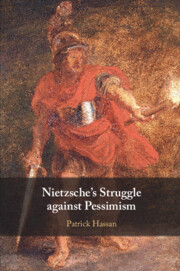Refine search
Actions for selected content:
3 results
19 - Rescission
- from Part 6 - Restitution and giving back
-
- Book:
- Remedies in Australian Private Law
- Published online:
- 25 October 2024
- Print publication:
- 12 November 2024, pp 504-526
-
- Chapter
- Export citation

Nietzsche's Struggle against Pessimism
-
- Published online:
- 02 November 2023
- Print publication:
- 16 November 2023
14 - Negation
-
- Book:
- The Evolution of Chinese Grammar
- Published online:
- 16 March 2023
- Print publication:
- 23 March 2023, pp 368-385
-
- Chapter
- Export citation
